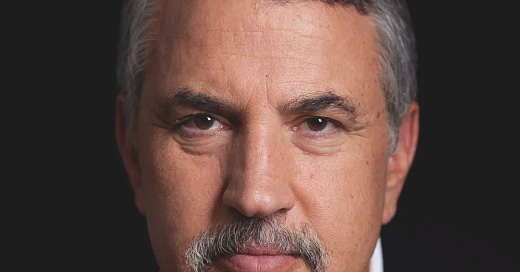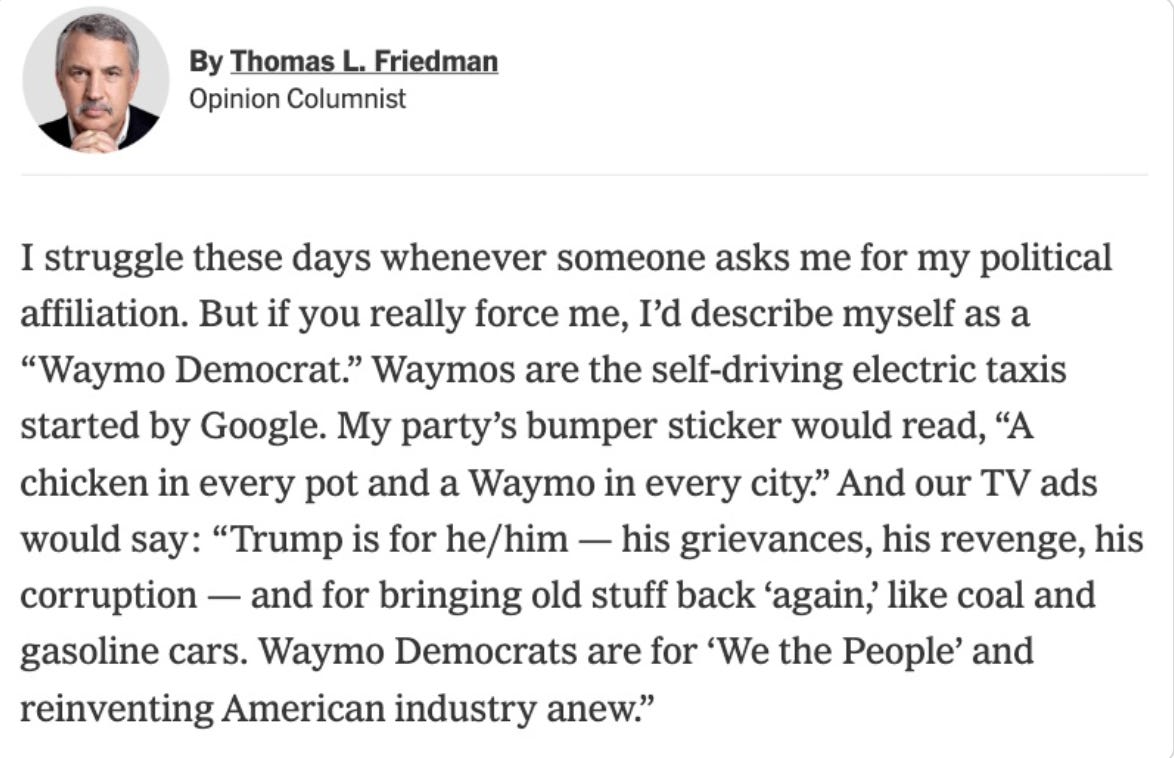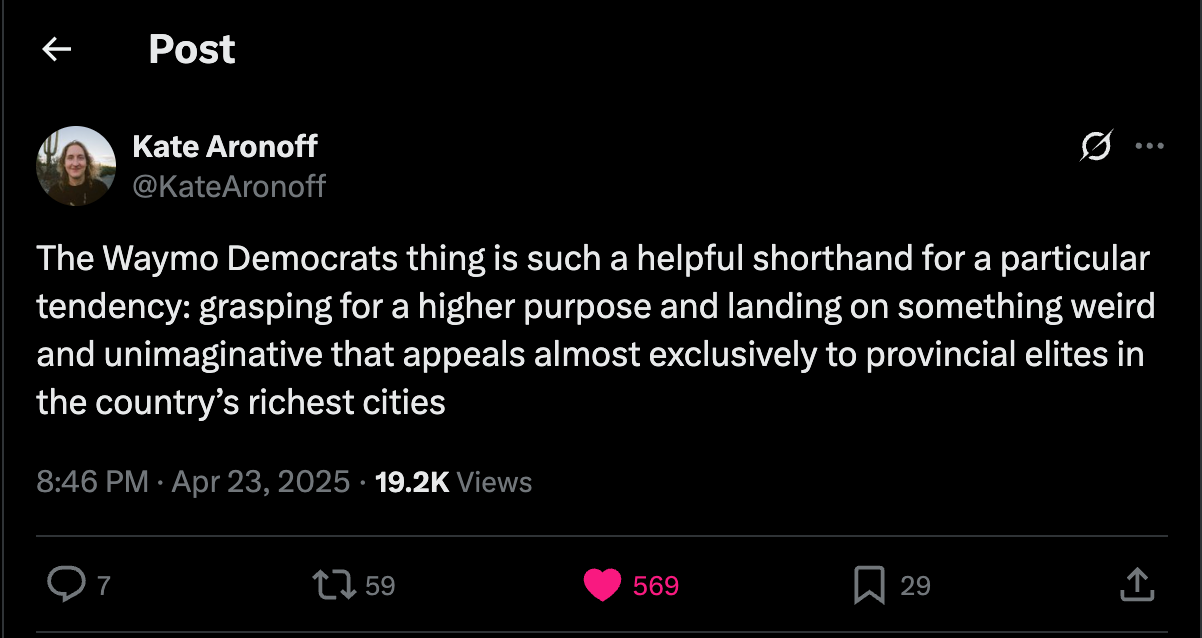I regret to inform you that Tom Friedman is at it again
In his latest column, neoliberalism's greatest bullshit peddler introduces us to one of his dumbest turns of phrase yet.
Tom Friedman might be one of the worst writers in the history of the English language, but he is nevertheless one without peer. I’ve been reading him obsessively for years, quietly devouring his latest neologisms and byzantine metaphors as a kind of sick pleasure. To date, I’ve only put the results of these mental safaris into writing just once (in the form of a 2023 piece for Jacobin).
The thing about Friedman is that he really does have only one idea and, though it’s fun to parody, there really isn’t much to actually grab a hold of. Plenty of intellectual charlatans at very least give us something tangible to engage with, even if we disagree with their conclusions or find them objectionable. Friedman’s great craft, instead, is to give us books and columns purportedly about everything but actually about nothing. At this point, his instantly recognizable mug has presumably accompanied thousands of columns all saying basically the same thing — his expression serene as an oracle who has communed with eternity; his hands perpetually clasped in reverence for its immortal truths.
Beneath the exotic textures of his terrible prose and convoluted imagery, however, there is really nothing besides the received wisdom of an affluent liberal micro-sect clinging to warmed over hokum from the 1990s: wow, things are moving fast, technology…now there’s a concept, society is growing ever-more interconnected, it’s time to move beyond the dogmatisms of left and right, etc etc. The end of history is over, but Tom Friedman somehow never got the memo. For the New York Times’ bestselling scribe, America continues to undergo a permanent revolution in which big (if largely unspecified) things are happening and fresh neologisms must relentlessly be coined to describe them.
In every sense, his latest effort is perfectly emblematic — if also gobsmackingly stupid even by the usual standard. Long time Friedman connoisseurs, in any case, will immediately spot a few longstanding trademarks. We have tech. We have taxis. We have a revolutionary agenda for a new American century and, in this case, we even have a newly coined political identity — the “Waymo Democrat” — to go with it.
Because no one else has a brain that works quite like Friedman’s, he will always be a special case and, for what it’s worth, I’m always going to enjoy reading a Tom Friedman column more than one written by a bloodless wonk making the exact same arguments. The virgin wonk gives us graphs and spreadsheets. The chad Friedman writes sentences like: “The first rule of holes is: when you're in one, stop digging. When you're in three, bring a lot of shovels.”
But, to finally turn to the substance of Friedman’s latest column (such as it is), he is yet again performing a tired old maneuver plenty of writers in the same gilded milieu have similarly perfected. In the paragraph above, we’re introduced to the “Waymo Democrat” — a supposedly emergent political identity around which a grand new popular coalition can be built with a new agenda to go with it.
Read on, however, and you quickly discover that this bold new agenda is just an incredibly lazy riff on ideas championed by centrist liberals since the Clinton era. Essentially, Friedman wants the Democratic Party to embrace the tech sector — spearheading new initiatives designed to foster the production of autonomous taxis and a series of adjacent industries tasked with providing the necessary manufacturing capacity and engineering know-how. To this end, he proposes free tuition for Ivy League graduates who successfully complete related degrees. He wants a new federal “Department of Engineering and Innovation” and a special government focus on the development of self-driving taxis. He wants big law firms who want to do business with the federal government to “have to offer a certain number of pro bono hours to any start-up building A.I. or other components for our robotaxi industry.”
If you’re wondering where the whole “Waymo Democrat” thing comes in, you’re probably not alone. To Friedman’s credit, I suppose, he tells us that “Waymo” refers to a Google-based autonomous taxi project in the first paragraph. But, if he hadn’t, I definitely would have had to look it up. No doubt, there is some constituency of Americans out there for whom the word “Waymo” actually means something (and I’d wager it overlaps heavily with the non-ironic audience for Tom Friedman columns). But, putting aside the obvious inanity of asserting the “Waymo Democrat” as some kind of broad political descriptor with the potential for life outside the context of a Tom Friedman column, I really don’t think it would scan to most people.
That wouldn’t matter, save for the fact that Friedman’s stated purpose here is to put forth a new agenda around which Democrats can again become “the party of the working class” (his words). With the nation’s taxis made fully autonomous it’s unclear who exactly our intrepid columnist might pretend to talk to in the future (fictional conversations with cab drivers have long had a load-bearing function in the wider Friedman universe). Regardless, the proverbial triple axel in a column like this is to conjure a wholly imaginary democratic constituency for something both insipidly unoriginal and entirely the concern of a tiny, affluent segment disproportionately represented in media and politics.
Doing the same damn thing elite Democrats and their corporate patrons have been doing for the better part of 30 years, it turns out, is actually very novel and exciting. A liberalism that embraces big tech and views elite universities as the vanguard of progress? Good grief. Whatever will they think of next?
As with Abundance, the new book by Ezra Klein and Derek Thompson I recently wrote about for this Substack, what’s actually going on here is yet another decidedly unconvincing attempt to represent the continuation of an exhausted and discredited project as a groundbreaking new blueprint for the future.
Among the most unshakeable beliefs of centrist liberalism since the 1990s is that there are functionally no alternatives to the political and economic status quo. Once you’ve fully grappled with the implications of that premise, you begin to understand why so much of elite liberal discourse is perpetually preoccupied with devising new ways of describing what already exists.
Liberalism, especially in America, has been a sclerotic ideology for decades — defined by intransigence, dogmatism, and elite capture even as its braintrust feigns openness and democratic ambition. Where this braintrust is able and willing to innovate has been mostly at the level of narrative. Save the wonkish details of whatever means-tested tax credit is hot this month, the question is no longer really one of principles or program. Since those are taken as a fixed point, and are not allowed to deviate from neoliberalism by definition, all that remains is to road test various possible stories about it and hope, desperately, that one eventually catches on.
Besides being by far the funniest example of what this looks like in action, Friedman is useful because his clunky prose, formulaic writing, and reflexive need to pretend there’s some vast constituency of ordinary people hungrily awaiting whatever bullshit his latest column is peddling betray the fundamental hollowness of the whole enterprise better than anything else ever could.







Man, this is so funny well written. I love this sentence “fictionalized conversations with cab drivers have long had a load-bearing function in the wider Friedman universe”. Friedman is such a bizarre liberal clown and I hope you never stop writing these kinds of hit pieces on him.
When Thomas Friedman sneezes, do you think his empty head makes a funny ringing noise or something? Or maybe it’s more like a drum.